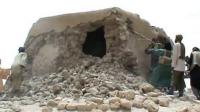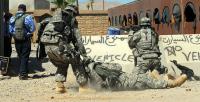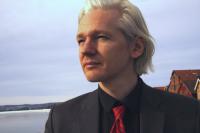-
Sahel youths susceptible to radicalization: UN envoy

Hiroute Guebre Sellassie, UN envoy to the Sahel region in Africa, said last week that up to forty-one million young people in the Sahel have nothing hut a bleak future to look to, pushing them to migrate and making them susceptible to radicalization. She said that young people under age 25 in Burkina Faso, Chad, Mali, Mauritania, and Niger “face hopelessness.” She noted that 44 percent of children in the Sahel lack access to primary education and only 36 percent of the population can read or write.
-
-
Russia, Syria triggered refugee crisis to destabilize Europe: NATO commander

General Phil Breedlove, NATO’s Supreme Allied Commander for Europe and head of the U.S. European Command, said Russia and Syria are indiscriminately bombing Syrian civilians to drive the refugee crisis and “weaponize migration.”He said that weapons such as barrel bombs, widely used by the Assad regime against Sunni civilian population, have no military value, and are used solely to terrorize those living in rebel-held territories. He told the Senate Armed Services Committee that the destruction formed part of a deliberate strategy by Russia and the Assad regime to “get them on the road” and “make them a problem for someone else.”
-
-
Syrian, Russian forces targeting hospitals as a war strategy: Amnesty
Russian and Syrian government forces appear to have deliberately and systematically targeted hospitals and other medical facilities over the last three months to pave the way for ground forces to advance on northern Aleppo, an examination of airstrikes by Amnesty International has found. Even as Syria’s fragile ceasefire deal was being hammered out, Syrian government forces and their allies intensified their attacks on medical facilities.
-
-
ISIS “spreading like cancer” among refugees: NATO commander

General Philip Breedlove, NATO’s top commander, on Tuesday told a congressional panel that refugees from the Middle East and north Africa are “masking the movement” of terrorists and criminals. In testimony to the Senate Armed Services Committee, Breedlove said that ISIS is “spreading like a cancer” among refugees. The group’s members are “taking advantage of paths of least resistance, threatening European nations and our own,” he said.
-
-
Destruction of Timbuktu sites by Islamists shocked humanity: ICC prosecutor

Fatou Bensouda, the International Criminal Court’s (ICC) chief prosecutor, speaking at the opening of the war crimes trial against a Malian jihadist leader charged with demolishing ancient mausoleums in Timbuktu, said the world must “stand up to the destruction and defacing of our common heritage.” Ahmad al-Faqi al-Mahdi, 40, is the first jihadist to is the first person to face a war crimes charge for an attack on a historic and cultural monument.
-
-
Cloud-based biosurveillance ecosystem

The Departments of Defense and Homeland Security are developing a system which lets epidemiologists scan the planet for anomalies in human and animal disease prevalence, warn of coming pandemics, and protect soldiers and others worldwide.
-
-
FBI cannot force Apple to unlock iPhone in drug case: Judge
Magistrate Judge James Orenstein in Brooklyn on Monday ruled that the U.S. government cannot force Apple to unlock an iPhone in a New York drug case. The ruling strengthens the company’s arguments in its landmark legal confrontation with the Justice Department over encryption and privacy. The government sought access to the drug dealer’s phone months before a California judge ordered Apple to give access to the San Bernardino terrorist’s handset.
-
-
ISIS executes eight Dutch jihadists for trying to desert

ISIS has executed eight Dutch followers after accusing them of trying to desert. The Dutch secret services say that about 200 people from the Netherlands, including fifty women, have joined ISIS in Syria and Iraq.
-
-
British, U.S. Special Forces training Libyan militias to fight ISIS

British Special Forces have been quietly deployed to Libya for the purpose of helping build an army to fight ISIS militants who have been increasing their presence in the country. The British commandos are working alongside U.S. Special Forces in and around the city of Misrata on north-west Libya to check the progress of jihadist militias.
-
-
WikiLeaks list not connected to terrorist attacks

The WikiLeaks organization was criticized for providing a target list for terrorists when it published a secret memo in 2010 with 200 international sites that the U.S. Department of Homeland Security considered critical to national security. Was there any truth to that claim?
-
-
In FBI versus Apple, government strengthened tech’s hand on privacy
The ongoing fight between Apple and the FBI over breaking into the iPhone maker’s encryption system to access a person’s data is becoming an increasingly challenging legal issue. This case is very specific, and in this narrow case, Apple and law enforcement agencies will likely find a compromise. However, this question is not going away anywhere. With the “Internet of things” touted as the next big revolution, more and more devices will capture our very personal data – including our conversations. This case could be a precedent-setting event that can reshape how our data are stored and managed in the future.
-
-
Suicide bomb detector moves close to commercialization with Sandia engineer’s help
On the chilling list of terrorist tactics, suicide bombing is at the top. Between 1981 and 2015, an estimated 5,000 such attacks occurred in more than 40 countries, killing about 50,000 people. The global rate grew from three a year in the 1980s to one a month in the 1990s to one a week from 2001 to 2003 to one a day from 2003 to 2015. R3 Technologies and a group of other small businesses are developing a way to prevent suicide attacks by detecting concealed bombs before they go off. R3 found a partner in Sandia sensor expert JR Russell who has helped bring the company’s Concealed Bomb Detector, or CBD-1000, close to commercialization over the past two years.
-
-
Refined interview technique can reveal terror plots
An interview technique for eliciting intelligence without asking questions has in a series of experiments proven to work very well. The idea dates back to the renowned Second World War interrogator Hanns Scharff, but has now, for the first time, been empirically validated. The technique can help intelligence agencies reveal plans of future terrorist acts.
-
-
French Special Forces join fight against ISIS in Libya
French Special Forces are among commando units operating on the ground in Libya against ISIS. A small French force has been operating out of Benghazi’s Benina airport, assisting forces of the internationally backed Libyan authorities in Tobruk. The Pentagon has said that in the absence of a unity government, U.S. Special Forces have been “partnering” with different militias for attacks on ISIS militants.
-
-
Wearing hijab is “passive terrorism”: USAF study
A study issued by the U.S. military has suggested that wearing the hijab by some Muslim women represents a form of “passive terrorism.” The study, originally issued by the USAF in 2011 and re-issued in summer 2015, includes a chapter which contains discussion of radicalization. In addition to the comment about hijabs, the chapter also claims that support for militant groups is driven by “sexual deprivation.”
-
More headlines
The long view
How Male Grievance Fuels Radicalization and Extremist Violence
Social extremism is evolving in reach and form. While traditional racial supremacy ideologies remain, contemporary movements are now often fueled by something more personal and emotionally resonant: male grievance.
